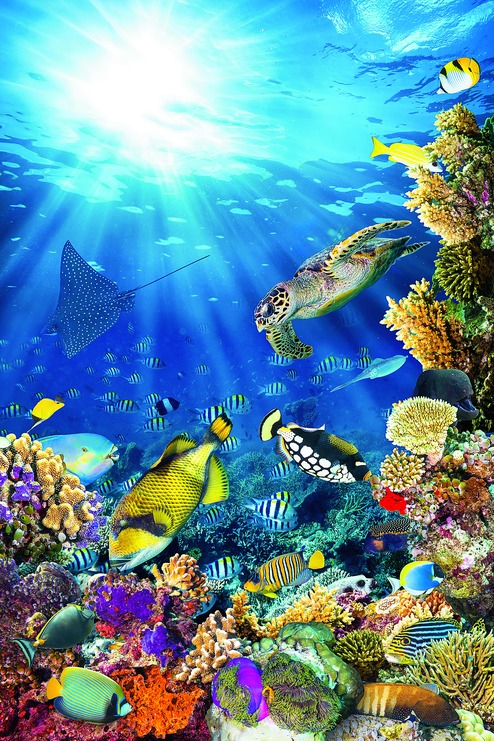
The 23rd round of UN-led climate change talks (COP23) starts today in Bonn, Germany, to discuss the alarming rise of carbon dioxide in the atmosphere. A network of over 250 scientists, in the meantime, is poised to present a groundbreaking study on how CO2 from the air has been fatally damaging ocean chemistry.
A gigantic carbon sink, the ocean currently dissolves a third of CO2 emissions. When absorbed by seawater, it triggers chemical reactions, causing the ocean to acidify. Increased acidity in the oceans - or ocean acidification - has been taking a heavy toll on a variety of marine organisms as well as Earth's climate, studies across various disciplines in 20 German institutions have found.
The eight-year study by German research network Bioacid (Biological Impacts of Ocean Acidification) highlights the risk of the cumulative effect of increasing acidity up the food chain and on marine ecosystems.
Ocean acidification is called the "evil twin of global warming" and compounds the effect of climate change. Scientists began studying the consequences of ocean acidification only in the last 10 years, but they have already made some startling discoveries.
According to the findings, the more the ocean acidifies, the less CO2 it can absorb. Therefore its function as a carbon sink that helps attenuate climate change will decline. As a result, the greenhouse effect will keep accelerating (because of increasing accumulation of CO2 in the air). Many organisms will suffer from ocean acidification - especially those that build their shells and skeletons from calcium carbonate, such as corals, mussels or certain species of plankton. Echinoderms such as starfish will also be negatively affected. Some species, however, will benefit from the additional CO2 in the water. These could include seagrass, jellyfish and picoplankton - which are among the smallest marine organisms. It goes without saying that ocean acidification will affect biodiversity negatively and severely change the marine ecosystem.

A large part of the world's coral reefs has already been destroyed or seriously damaged. Drastically reducing global CO2 emissions could save about half of the world's tropical reefs. "We need to see ourselves as part of a global system and understand the many ways in which we depend on the ocean and its services. Because everyone in this global community will be affected by climate change, it will be to our own benefit if we manage to reduce CO2 emissions in such a way that global warming is limited to less than 2° Celsius," said Ulf Riebesell, marine biologist at Geomar Helmholtz Centre for Ocean Research in Kiel and a co-ordinator of Bioacid. He was addressing a team of science journalists who were visiting research labs in Germany at the invitation of the German Academic Exchange Service or DAAD.
Since the Industrial Revolution in the mid-19th century, humans have released around 440 billion tonnes of CO2 into the atmosphere from the burning of fossil fuels such as coal, natural gas and crude oil. Plants process this gas into oxygen through photosynthesis. The oceans also act as CO2 sinks by binding the colourless gas. If these natural stores did not exist, our planet would heat up much more and even faster than it does today.
So the oceans help slow down global warming, but CO2 from the atmosphere reacts with seawater to form carbonic acid. As a result, the pH of water decreases - it becomes more acidic. To neutralise itself, the acidified water (or carbonic acid) breaks down into bicarbonate (alkaline, restores pH) and hydrogen ions. Some of these hydrogen ions combine with the carbonate already present in the water to form bicarbonates. Calcifying organisms (corals, mussels and starfish) use carbonate to build their shells and skeletons. The more carbonate is lost due to the chemical reactions in seawater, the more difficult calcification becomes.

Ocean acidification and warming also reduce the survival rates of some fish species. This will affect fish stocks and eventually reduce yields of fisheries. This will significantly affect economic activities such as small-scale coastal fisheries, aquaculture (such as shrimp farming) and tourism.
According to Hans-Otto Poertner, co-ordinator of Bioacid and marine ecophysiologist at the Alfred Wegener Institute in Bremerhaven, all countries would need to reduce their CO2 emissions drastically by the middle of the century, as outlined in the Paris Agreement negotiated in December 2015 at the 21st Climate Change Conference. He said, "The current world climate report indicates clearly that net-zero emissions are a pre-condition for limiting global warming to well below 2° Celsius. However, reducing CO2 emissions alone may not be sufficient. We would also need to remove some of the CO2 already present in the atmosphere. This is technically feasible, but the challenge is to develop and implement it on a larger scale."
Riebesell sums it up poetically, "The future of the planet depends on us. Wouldn't it be great if the anthropocene - the age of human dominance on Earth - goes down in history as an era of rethinking and changing behaviour?"
Amen to that.










